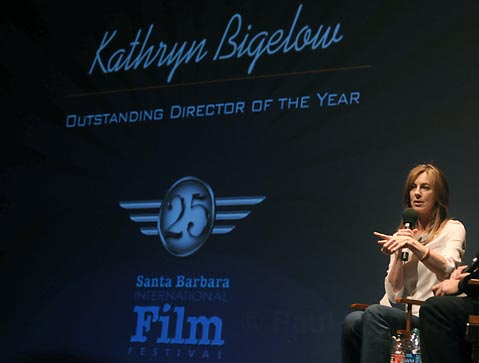Woodard Reports from The Art Locker
Vet Fester Waxes on Bigelow, Reviews SBIFF Sidebars

For my money, the single most brain-seizing scene in an American movie during 2009 comes late in Kathryn Bigelow’s masterful The Hurt Locker, when Jeremy Renner surreally strolls the aisles of a generic American supermarket, with its glaring fluorescent lights, embarrassment of product options and ambient music akin to the soundtrack of the suicide parlor scene in Soylent Green. He has just returned home, from the mean Iraqi streets where he seeks to defuse bombs for fun, profit and his country, and the absurdity of war — why we’re fighting, and for what values and material excesses — seems somehow emblematic of the perverse priorities in American culture.
Monday was Bigelow day in Santa Barbara, as the SBIFF paid tribute at the Lobero, and screened her special filmography all day. At the same time, the festival also is playing into the supposed Oscar-eager wrestling match between ex-spouses: James (Avatar) Cameron in one corner, the popular favorite, and Bigelow, the thinking person’s favorite, in the other.
At the Lobero, when asked by tribute moderator Roger Durling about the unusual casting tactics in The Hurt Locker, in which the famed Guy Pearce is quickly killed off and relative unknowns own the spotlight (sorry for the tiny spoiler), Bigelow explained that she wanted to “create a destabilizing feeling. What you expected to happen won’t necessarily happen… that sense of uneasiness was important, to amplify the theater of combat.”
Even if it has only made a tiny box office fraction of Avatar, The Hurt Locker is clearly the great American movie of the year, for its relevance to this historical moment, and for its uncanny artistic mixture of emotional destabilization and sure-handed artistry.
SIDEBAR RUNDOWN: So far the Latin American cinema offerings have been disappointing, compared to juicier years past. Backyard is an eye-opening and tensely engaging overview, fictionalized, of the still-plaguing female murder rate in Juarez, just across the border from El Paso, Texas, but a world away. But the Venezuelan A Distant Place and the Argentine Green Waters make for a dull sitting at the movies (although there is always the secondary intrigue of just seeing how other countries and cultures look and feel).
In the items from the “Focus on Quebec” sidebar, the fare is uneven, but leans towards the thumbs up — especially the fascinating low-budget wonder I Killed My Mother, surely one of the best films in the festival, and Polytechnique is a chilling, artfully-made account of the 1989 massacre at a Montreal college, akin to Gus Van Sant’s hypnotic school shooting film Elefant. On the other hand, The Wild Hunt’s brute, indulgent ramblings — violent in the guise of being anti-violence — is a drag, and the caper film Sticky Fingers has some sensuality and bubbly wit in its favor but wears out its welcome. Je me souviens, however, is a quirky delight, a darkly comic and semi-historical fairytale in black and white, and a left field Irish element, for added oddball charm.



